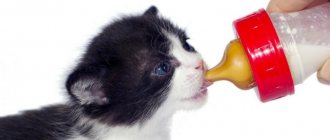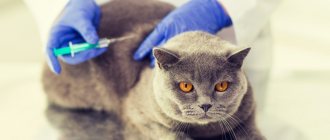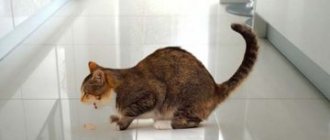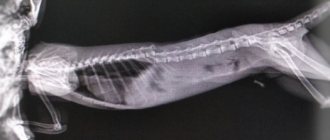Constipation is a problem not only for humans, but also for animals. Cats suffer from defecation retention just like humans. Some owners do not pay attention to the fact that their pet cannot go to the toilet for several days. This is especially difficult to trace if the cat is used to doing its business on the street. In this case, you can look and miss the moment when the animal can be cured with home remedies. Feces that accumulate in the intestines for a long time can provoke various diseases, so it is important to provide timely assistance to your pet.
Causes of constipation in a kitten
Constipation is a problem that some pets face. Delayed defecation occurs in babies, in particular in kittens. This phenomenon is unpleasant, and in some cases very dangerous. Therefore, measures must be taken immediately.
The answer to the question of what exactly needs to be done when a small kitten is constipated depends on the reasons that caused the malfunction in the body. There may be several of them.
Most common
Most often, defecation delay occurs due to digestive problems. Moreover, in kittens from birth to 3 months, various phenomena can affect intestinal function.
Kittens are born blind and deaf, and therefore in the first weeks of life they cannot do without their mother: she pushes them to the nipples and licks their tummy and places near the genitals. The last point is a very important point. Babies cannot go to the toilet on their own, and therefore the cat stimulates bowel and bladder emptying with a massage.
The second important point is that the microflora in the gastrointestinal tract of kittens appears when they feed first on colostrum and then on mother’s milk. For this reason, constipation in a newborn kitten can cause the baby to be switched to artificial nutrition due to the fact that the cat stops feeding the cubs (there are different reasons) or she does not have enough milk.
It’s a different matter when it comes to constipation in a kitten who is 1 month old or a little older - at this age the baby usually begins to supplement its feeding, which makes its intestines more vulnerable. The predominance of protein in the diet or lack of water, especially when dry food is introduced, low-quality industrial food - these and other phenomena cause the kitten to not be able to go to the toilet normally.
Closer to 2-3 months, a problem such as the presence of a foreign body or a hairball in the kitten’s intestines is added - they form a kind of plug, which leads to constipation. Foreign bodies are often small balls, buttons or pieces of cellophane. Kittens swallow them while playing or out of curiosity. Most often, hairballs appear in the stomach and intestines of babies of long-haired breeds.
Another common cause of constipation in kittens is a sedentary lifestyle. These animals need to constantly run, jump and play. Passivity leads to deterioration of intestinal motility and, as a consequence, constipation.
Kittens, like any living creature, can experience stress due to being separated from their mother, a change in environment, and the presence of unfamiliar people or animals nearby. And this is another reason for disruptions in the body.
A dirty litter tray also leads to constipation. Some kittens, already at an early age, refuse to go to the toilet if the owner did not have time (or did not want) to remove traces of the baby’s previous visit to the litter box. Therefore, pets retain feces - this is also typical for animals. This phenomenon, if repeated regularly, eventually turns into a problem.
Prevention
The best way to control the problem is prevention. Simple rules help reduce the risk of relapse:
- Regular combing of hair should be a mandatory procedure for caring for your cat.
- After treatment, nutritional adjustments are made with increased fluid intake. The pet needs to be fed foods with fiber and added vitamins and minerals.
- If possible, transfer from dry to wet food.
- Do not expose the animal to stress.
- A cat's life should be active. The cat is forced to move and play more.
- Give your pet a paste with cleansing phytomins.
- In the postoperative period, introduce probiotics into food.
Possible serious pathologies
There are also more serious causes of constipation in kittens. Here are the most common ones:
- Worm infestation. The disease is serious and requires surgical intervention by a specialist, since parasites can seriously undermine the baby’s health. One of the signs by which you can determine that a kitten has worms is that its body becomes like a pear. It is not recommended to give parasite medications to your pet on your own. Here you need to consult a specialist: he will determine the type of parasites, select the appropriate drug and give recommendations on dosage.
- Neoplasms in the intestines. Tumors, polyps and other growths on the walls of the intestines lead to narrowing, and in the most serious cases, to complete blockage of the lumens. As a result, feces simply cannot move further and accumulate in the intestines.
- Injury to the intestinal walls. Often the cause is the ingestion of seeds with sharp edges.
You will not be able to cope with these problems on your own. Only a specialist can make a diagnosis and decide on therapy after conducting the necessary examinations.
If you do get sick with COVID-19
It is important to inform the doctor treating COVID-19 about the chronic disease you have and the medications you are taking.
.
This will allow the doctor to choose the safest treatment for you and avoid prescribing medications that may adversely interact with the medications you regularly take.
If you have chronic liver disease, when infected with COVID-19, you should avoid an overdose of paracetamol (no more than 2 grams per day), and also minimize the use of non-steroidal anti-inflammatory drugs. Do not cancel your ongoing treatment for liver disease; discuss with your doctor the addition of ursodeoxycholic acid for the prevention and treatment of drug-induced liver damage.
If you have an autoimmune liver or intestinal disease, doctors recommend continuing your ongoing therapy, but taking medications such as azathioprine and methotrexate may be temporarily suspended.
If you have GERD or a peptic ulcer, then among antisecretory drugs you should give preference to rabeprazole or pantoprozole - safer in terms of the risk of drug interactions. It is important to avoid or minimize the use of non-steroidal anti-inflammatory drugs. During the period of COVID-19 disease, to prevent complications, doctors recommend additionally taking drugs that have a protective effect on the mucous membrane of the esophagus and stomach (rebamipide, etc.).
Clinical symptoms
Before deciding what to do with a kitten in the first weeks of life, at 1 month, or with an older cat, you need to make sure that he really is constipated. After all, sometimes defecation once every 2-3 days can simply be a feature of the body.
Some tips on how to tell if your kitten is constipated:
- The baby doesn't go to the toilet for three days. Sometimes he has difficulty squeezing out some hard and dry feces in the form of small peas.
- The kitten sits in the tray for a long time in the appropriate position, as it cannot empty its intestines and meows loudly. The feces contain blood and mucus.
- The small pet becomes passive and apathetic and periodically makes alarming sounds. His appetite disappears or decreases. Vomiting (or frequent urge to do so) often occurs.
- The kitten's tummy becomes enlarged and tense. Touching it causes pain or discomfort in the baby.
If the pet is not helped in time, he begins to lose weight and experience fear of the litter box. The most serious consequences are intoxication of the body, intestinal ruptures and even death.
How often should a cat go to the toilet?
Defecation rate for cats:
- Adult pet - 1 time per day.
- Kitten - 1-2 times a day, kittens have an increased metabolism, food is digested faster.
- Elderly animal - 1 time in two days; in pets older than 6 years, the metabolism decreases.
According to veterinarians, constipation is considered to be a delay of three or more days. Associated symptoms: anxiety, lack of appetite.
Doctors recommend examining your pet's stool to identify the disease at an early stage. In a healthy cat, feces are oblong in shape, dark brown in color, and soft in consistency.
Deviations:
- overly dry, cracked “balls”,
- liquid consistency,
- unusual color (gray, yellow, red),
- presence of foreign inclusions
First aid at home
Any malfunctions in the pet’s body should be a reason to go to the veterinary clinic. But in some cases, the owner is able to provide first aid to a constipated kitten at home. You just need to remember that the baby’s body is still quite fragile, and therefore you need to act very carefully.
Here are some options for what to do if your kitten is constipated before visiting the vet:
- A newborn baby who is left without a mother will most likely benefit from stimulation of the digestive process. To do this, you need to imitate the actions of a cat: moisten a cotton pad in warm water and give it a light massage of the tummy and areas near the genitals. If constipation is caused by changes in diet, this may be enough to make the baby poop.
- If the pet is older and is given dry food, you need to make sure that the kitten drinks more water. If the pet refuses to do this on its own, you need to periodically bring it to the bowl and tilt its muzzle towards it.
- Foods that cause constipation should be excluded from the diet of a kitten aged 2 months and older.
- Get your baby, who prefers to spend most of his time on the couch, to move. Balls or joint games will help with this.
Even an inexperienced owner can provide such assistance to a kitten. It is important that such actions will definitely not harm the small pet. If you suspect the presence of a foreign object, worms or intoxication in the intestines, it is better not to take risks, but try to immediately show the baby to the veterinarian.
What to do
- Position your kitten for stimulation by holding him in your non-dominant hand under his belly with his rear or butt facing you.
- Wrap a warm, damp washcloth over your dominant hand and stimulate the kitten's abdomen and anal area. You can also use soaked cotton pads or gauze.
- Using your hand and fingers, gently massage the kitten's anal area through the cloth or napkin.
- Check to see if the kitten has pooped, and if not, continue massaging the anal area until the kitten poops.
- Adjust the warm cloth or napkin to ensure the food doesn't stain your kitten, and if you use a napkin, cotton wool or gauze, be sure to dispose of it properly.
- Be sure to clean and dry your kitten as soon as you see that he has stopped pooping.
- Return the kitten to its cage or box and wash your hands thoroughly.
Also, make sure the litter box is cleaned and disinfected regularly because kittens can be very picky about smells. Also ensure that your kitten's litter box is located in a quiet area of your home, away from noise and activity.
Professional veterinary care
The following activities require more experience with animals. And some of them are not at all advisable for an owner who has never encountered anything like this before. The best option is to talk to a veterinarian who will examine the kitten, give recommendations for further therapy and tell you how not to harm the baby.
Professional assistance includes the following:
- Abdominal massage. Somewhat reminiscent of the one they make for small children. These are circular stroking movements with your hand, which should start the work of the gastrointestinal tract. Massage will help your kitten if constipation is caused by poor diet, stress, or a small foreign body that can come out naturally.
- Duphalac, Lactusan and other similar lactulose-based drugs. They are prescribed for constipation in newborn children, and in the case of animals they will also be safe and effective. The drugs can be given to a pet who is several weeks old if he has been transferred to artificial feeding. The dose is selected taking into account the weight of the kitten.
- Vaseline oil. To some extent, a universal product: it can be dropped into the kitten’s mouth or added to food when taking emergency measures, as well as for prevention. Vaseline oil is often used in an enema. The product is not absorbed into the blood and intestines. When it enters the gastrointestinal tract, it envelops the intestinal walls with a film and covers feces, making them softer and faster out of the body. Usually the kitten is allowed to give Vaseline oil 2-3 times a day. It is better to discuss the permissible amount with your veterinarian.
- Soap in the form of a small candle. It is inserted into the kitten's anus if there are no signs that it is inflamed. A side effect when providing assistance in this way is sometimes an allergy to the composition of the soap, so it is recommended to choose only children's soap.
- Enema. To carry out the procedure, you can use a small bulb or a 10 mm syringe without a needle. Pure water or chamomile solution are suitable as a solution. The tip must be lubricated with greasy cream or Vaseline oil. The liquid is administered through the anus very carefully - the pet should be in a standing position over a tray or other container. It is undesirable to carry out the procedure yourself if the owner has never seen how it is done. The reason is that if you introduce a lot of liquid, the intestinal walls can burst, and this is fraught with more serious problems than constipation. An enema is also dangerous if there are neoplasms, foreign objects and wounds in the gastrointestinal tract. Typically, the cleansing procedure is carried out by a veterinarian after the cause of constipation has been determined.
The specialist determines the cause of constipation in a week-old, month-old or older kitten, and also decides what to do next after taking a full history. It includes:
- conversation with the owner;
- blood, urine and stool tests;
- X-ray with contrast agent:
- Ultrasound of the abdominal cavity.
In some cases, an MRI is performed - the procedure allows you to confirm or refute the suspicion of oncology.
Based on the results of the examinations, treatment is selected for the kitten. Sometimes it involves an enema, an IV with a maintenance drug, and surgical removal of a foreign object. After visiting the veterinarian and receiving recommendations, you must strictly follow all instructions to prevent complications of the disease. It is very important to complete treatment, including when it seems that your pet is no longer constipated.
The final stage of the procedure
This procedure will have a positive effect on the condition of your furry pet. Firstly, massage helps to improve intestinal motility and increase blood circulation, which will undoubtedly affect the overall well-being of the animal. Secondly, the kitten will be able to learn to trust the new owner, perceiving him in no other way, namely in the role of a mother cat. Thirdly, without resorting to the use of medications approved for use only after veterinary consultation, you can cope with the problem and make the kitten’s life easier.
If everything went according to plan and the desired result was achieved, the next step is cleaning. You need to start with the animal. After defecation, you must carefully wipe your pet's butt, being careful not to damage the anus or cause any infection.
The next step is to clean the surface over which the manipulation was carried out. Having removed the kitten to its usual resting place, you can begin cleaning. It is advisable to use harmless disinfectants. If the kitten is not the only inhabitant in the house among the small furry balls, then everything is ready for the procedure with the following ones.
At the end of the manipulations, it is important not to forget about simple hygiene rules and mandatory hand washing.
Can complications occur?
One of the serious consequences of not treating constipation in a kitten is the transition of the disease to the chronic stage. This means that your pet will continue to have problems with bowel movements in the future: for example, from time to time he may have difficulty going to the toilet or his intestines will be partially emptied. This means that intoxication of the body will continue. Its manifestation is a noticeable decrease in activity, appetite and weight and frequent nausea.











